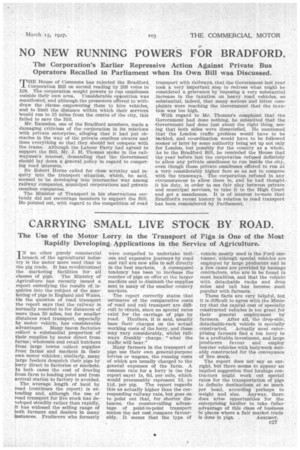NO NEW RUNNING POWER'S FOR BRADFORD.
Page 49

If you've noticed an error in this article please click here to report it so we can fix it.
The Corporation's Earlier Repressive Action Against Private Bus Operators Recalled in Parliament when Its Own Bill was Discussed.
THE House of Commons has rejected the Bradford Corporation Bill on second reading by 203 votes to 128. The corporation sought powers to run omnibuses outside their own area. Considerable opPosition was manifested, and although the promoters offered to withdraw the clauseempowering them to hire vehicles, and to limit the distance within which their services Would run to 15 miles from the centre of the city, this failed to save the Bill.
• Mr. Ramsden, one of the Bradford members, made a damaging criticism of the• corporation in its relations 'with private enterprise, alleging that it had put obstacles in the way of the private omnibus owners and done everything so that they should not compete with the trams. Although the Labour Party had agreed to support the Bill, Mr. J. H. Thomas spoke in the railwaymen's interest, demanding that the Government should lay down a general policy in regard to competing road interests.
Sir Robert Horne called for close scrutiny and inquiry into the transport situation, which, he said, seemed to be developing into internecine war among. railway companies, municipal corporations and private ,omnibus companies.
The Minister of Transport in his observations certainly did not encourage members to support the Bill. He pointed out, with regard to the competition of road transport with railways, that the Government last year took a very important step to redress what might be considered a grievance by imposing a very substantial increase in the taxation on heavy road vehicles, so substantial, indeed, that many serious and bitter complaints were reaching the Government that the taxation was too high.
With regard to Mr. Thomas's complaint that the Government had done nothing, he submitted that the Government had done just about the right thing, seeing that both sides were dissatisfied. He mentioned that the London traffic problem would have to be tackled, and co-ordination would have to be followed sooner or later by some authority being set up not only for London, but possibly for the country as a whole. As to the Bradford Bill, he reminded the House that the year before last the corporation refused definitely to allow any private omnibuses to run inside the city, even though those private omnibuses offered to run at a veryconsiderably higher fare so as not to compete with the tramways. The corporation refused in any circumstances to allow them in, and he had thought it his duty, in order to see fair play between private and municipal services, to take it to the High Court and get a mandamus. It is of interest to-note that Bradford's recent history in relation to road transport has been remembered by Parliament.












































































































